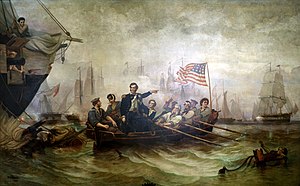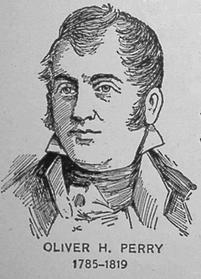Oliver Hazard Perry
Oliver Hazard Perry (born August 23, 1785 in South Kingstown , Rhode Island , USA , † August 23, 1819 at sea near Port of Spain , Trinidad ) was an American naval officer who became known through the war of 1812 with Great Britain .
Life
Oliver Hazard Perry was born the eldest of eight children to American naval officer Christopher Raymond Perry and his wife Sarah Alexander Perry. A younger brother was Matthew Calbraith Perry (1794-1858), who became known through the forced opening of Japan in 1853/1854. It was named after his maternal grandfather and an uncle who died at sea. At the age of 13, the strong-willed and spirited Perry decided to join the US Navy . In 1799 he took up his duties as a midshipman ( midshipman ) on the commanded by his father frigate USS General Greene to. During the next seven years he was involved in the undeclared war with France and the war with the North African barbarian pirates ( First Barbarian War ). a. he served on later famous ships such as the USS Adams , USS Constellation , USS Essex and USS Constitution .
In 1805, Perry was promoted to lieutenant . From 1806 to 1807 he had the little appreciated task of building a flotilla of gunboats in Rhode Island and Connecticut , and in 1809 was given command of the schooner USS Revenge (14 guns). With this ship he first belonged to a squadron under Commodore John Rodgers, but was moved to Charleston ( South Carolina ) in 1810 . On the way there, however, the ship was damaged by a severe storm; In addition, there were considerable health problems for Perry, who could not stand the unhealthy summer climate in the southern states . On January 8, 1811 was USS Revenge in block Iceland Sound on a reef and sank. In the court martial that followed, Perry was acquitted and praised for his behavior in the sinking of the ship. Responsibility for the accident was assigned to the pilot.

After the process, Perry initially retired from active service and married twenty-year-old Elizabeth Champlin Mason in Newport, Rhode Island . The marriage described as happy had five children, one of whom died young. In May 1812 he returned to active service and was promoted to master commander ( lieutenant captain ). After the outbreak of the war with Great Britain in 1812 he was given command of a flotilla of 12 gunboats in Newport and New London (Connecticut) . Perry, he tried in vain for a new command on the high seas or on the Great Lakes until he was transferred to Commodore Isaac Chauncey in Sackets Harbor on Lake Ontario in February 1813 . Chauncey gave him command of the flotilla under construction on Lake Erie . With great energy he managed to build up a powerful fleet and win the arms race against his British counterpart Robert Heriot Barclay, who was handicapped by a lack of supplies and personnel . Due to the increasing supply problems of the British, Barclay had to face battle on September 10, 1813. It is true that Perry did not succeed in the battle on Lake Erie in the beginning to bring to bear the superiority of his numerically superior as well as much better armed and manned flotilla, which is why his flagship USS Lawrence was put out of action by the British and three quarters of his crew were killed or were wounded. The reinforcements brought in by him personally by boat decided the battle in favor of the Americans, who had to surrender the entire, badly battered British flotilla. Perry's brief message about the victory of General William Henry Harrison became famous :
Dear General: We have met the enemy and they are ours. Two ships, two brigs, one schooner and one sloop. Yours with great respect and esteem, OH Perry
Together with Harrison's subsequent land victory in the Battle of the Thames River on October 5, 1813, in which Perry also took part, the Battle of Lake Erie decided the war on the western scene and contributed significantly to the fact that this was despite the American failures on others Locations with the Peace of Ghent on the basis of the status quo was ended. Perry himself became a national hero with his victory. After the end of the fighting in the west Perry was transferred back to New England at his request and received in addition to the promotion to captain, the command of a gunboat flotilla in Newport. In July 1814, he was promoted to commander of the 44-gun frigate USS Java, which was still under construction in Baltimore . During the British invasion of Chesapeake Bay in the summer of 1814, he participated in the unsuccessful efforts to defend Washington and the successful defense of Baltimore. However, the war ended before his ship was finished and could set sail.
As a result, the USS Java cruised in the Mediterranean Sea to put the barbarian pirates in their place. While the ship was at anchor in the port of Naples , a dispute broke out in the course of which Perry slapped John Heath, the commanding officer of the Marines on board. In a subsequent court martial, both were found guilty, but received only mild reprimands. After returning to the United States, Heath Perry challenged a duel that was played on October 19, 1817 in Weehawken (New Yersey) . Both were unharmed.
After his return, Perry's hostility to Jesse Duncan Elliott , whom he had replaced as commander on Lake Erie, also resurrected. The renewed confrontation led to a duel demand Elliotts, which Perry refused. Instead, he filed for a court martial against Elliott, who he accused of serious breaches of duty in the Battle of Lake Erie. However, the US government had little interest in a lawsuit as this would cause a public scandal and split the US Navy, so President James Monroe decided not to go ahead with the trial. To calm and distract the impetuous Perry, he entrusted him with carrying out a diplomatic mission in Venezuela .
Perry sailed for this in June 1819 with the frigate USS John Adams to the mouth of the Orinoco , where he switched to the schooner USS Nonsuch and traveled up the Orinoco to Angostura , the capital of Venezuela at that time. Perry reached the city on July 27, 1819 and stayed there for two and a half weeks to complete his duties. In this short time, 20 crew members of the USS Nonsuch fell ill with yellow fever and five died of it. Perry was still healthy when the ship left on August 15, but two days later he developed yellow fever as well. While the USS Nonsuch attempted to reach Port of Spain in Trinidad , his condition deteriorated dramatically until he died at sea just outside Trinidad on August 23, 1819, his 34th birthday.
He was buried with full military honors in Port of Spain, and thus on British soil. In 1826 his remains were brought to Newport and buried there. In honor of Perry's several places (were z. B. Perry (New York) , Perrysburg , Perryville and Perry in Ohio and Hazard (Kentucky) and counties ( districts ) ( Perry County (Alabama) , Perry County (Kentucky) and Perry County ( Pennsylvania) ) named after him. The US Navy also named several ships, most recently the guided missile frigate USS Oliver Hazard Perry (FFG-7) , which gave its name to the Oliver Hazard Perry class . Furthermore, in 2015 the largest sailing training ship built in the United States for 100 years, named Oliver Hazard Perry .
literature
- Richard Dillon: We Have Met the Enemy. Oliver Hazard Perry, Wilderness Commodore. McGraw-Hill, New York NY 1978, ISBN 0-07-016981-0 .
Web links
- US Brig Niagara: Oliver Hazard Perry
- National Park Service ( Memento from June 20, 2008 in the Internet Archive )
| personal data | |
|---|---|
| SURNAME | Perry, Oliver Hazard |
| BRIEF DESCRIPTION | American naval officer |
| DATE OF BIRTH | August 23, 1785 |
| PLACE OF BIRTH | South Kingstown, Rhode Island , USA |
| DATE OF DEATH | August 23, 1819 |
| Place of death | at sea at Port of Spain , Trinidad |
